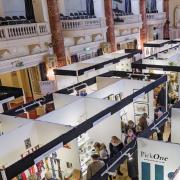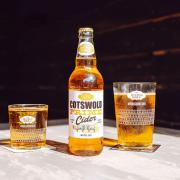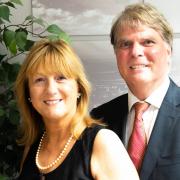Trailing around factories with her father got Viv Empson hooked on a career in manufacturing. At TBS Engineering, she’s made it her own

Viv Empson is something of a trailblazer. I suspect she might have something to say about that particular label, but she wears the trousers all right. Literally.
When we meet, I say I’m going to ask her about how she’s future-proofing TBS Engineering’s core business - producing world-beating automatic machinery for the lead acid battery industry - about its exporting success, the importance of apprentices and women in engineering, of which much has been written of late.
Numbers are rising - 11% of the UK workforce is now female, compared with 9% in 2015 - thanks to a focus on STEM subject take-up in schools, the drive for meaningful apprenticeship programmes and a push for women to take up engineering as a degree.
Big employers like Jaguar Land Rover are running women-only programmes in a bid to balance out the 91% of automotive jobs currently filled by men.
But there’s still a way to go. Because we still have the lowest percentage of female engineering professionals in Europe.
Engineering and manufacturing are in Viv’s blood. She caught the bug aged 11 visiting factories and mills in the summer holidays with her chemical engineer father.
Not that she knew it then, because the schoolgirl harboured ambitions to be a vet, then a criminal psychologist.
She did her dissertation at Dartmoor Prison but in the early 80s, jobs in criminal psychology were few and far between, so a correspondence course in accountancy beckoned. And it changed the course of her life.

She wrote to companies all over the UK, desperate to find a job. She landed one at Permali in Gloucester as a Cost Clerk.
Two days later, her father dropped her off at a phone box to ring landlords to secure digs.
She joined TBS as Finance Manager in 1989, when Thomas Stamp’s company was still based in a row of terraced houses in Cheltenham’s Windsor Street.
She was the first woman to wear trousers to an interview at the company whose culture was still skirts and dresses only, because “nobody wanted to be a rebel”.
Viv did it anyway.
“I’m still in trousers now,” she laughs.
Today, she is HR and Finance Director - roles which she insists are totally complementary. The thing that makes good business, she says, is good people.
TBS’ nerve centre is now a 100,000sq ft building in Brockworth, the offices flooded with light with a huge development area, the modern factory floor open.

If you ride a Harley Davidson motorcycle or drive a BMW, Mercedes or Volkswagen - or play golf at the weekend - chances are there’s a battery under the bonnet made on a TBS machine.
Batteries for the floor cleaning industry, batteries for stand-by back-up power, batteries for hybrid vehicles - they’re all industries TBS serves.
The company has won a coveted Queen’s Award for Export and has 200 staff. It’s a far cry from the early days of TBS.
“It was very different back then,” she says. “We employed 30 or 40 people, we did very little exporting because the owner just wasn’t interested, it was a private company.
“Customers used to come into the office with suitcases of £1 notes and I’d go to the local bank, handcuffed to them, and put the money in the night safe. It was a different world.”
When Stamp retired and Laurie Gardener took over as Managing Director, TBS’ fortunes immediately turned around. As did the whole culture of the business, thanks to Viv’s vision.
“Then, you could very much still smoke in offices and factories,” she says.
“When I joined we were building a new facility in Elmstone Hardwicke and we made the decision that we didn’t want people smoking. Which actually was quite progressive.”

I ask her how this went down with a factory full of men.
“It was pretty interesting,” she laughs. “We did it progressively.
“So we said the staff could smoke four days a week, then three, then two. But on the days they didn’t smoke, they had a doughnut. So we were a bit healthier in the lung department than we were round the waistline, but it worked.
“We went from this very small, backstreet engineering company - you can imagine what it was like trying to get these huge lines up to 40m long down a residential street, having to knock on people’s doors to ask them to move their cars - to a purpose-built, 26,000sq ft unit in Elmstone Hardwicke.
“And we thought back then it was amazing, but we continued to expand through products and exports.”
The company began to branch out into new markets, a strategy which has seen turnover rocket from £25m in 2010 to an impressive £40m today with a presence in 90 countries, notably the US and China. Its key sectors are the automotive industry and back-up power for hospitals and telecoms giants.
“The key thing is, the world needs energy for all the gizmos that we have,” says Viv. “But we need to store energy. And these little black boxes store energy. They’re cheap, they’re safe, they’re cost-effective.”
What’s astonishing is that lead is one of the world’s most recyclable materials. The green credentials of the industry are impressive - particularly when the perception is that engineering is grimy and polluting.
“Lead is the most environmentally-friendly product on the planet,” Viv says. “Which is just amazing.
“The world would be a much better place if every other product was as recyclable. That’s really important, particularly for the next generation, to know that they’re part of something that’s progressive, environmentally-friendly and that has a massive future.”
Viv smiles when she remembers one management consultant estimating, years ago, that TBS would have a five-year shelf life if it was lucky.
“We’re at the forefront of automation,” says Viv. “Handling lead is something that you have to monitor and come up with automation to take away risk. Plus it’s heavy.
“To be able to provide solutions to progressive companies to help them automate is something we’re at the forefront of. It proves British manufacturing is thriving, that we can be world-leaders, and we are. That’s something we’re incredibly proud of.”
In the top tier, there are four of five companies in the world doing what TBS does. The company, now part of Berkshire Hathaway, has, as Viv says, earned its stripes.
She’s been through five changes of ownership and is excited, optimistic about the future.
“We’ve had to be very patient,” she says. “You try something, it doesn’t work, you move on to the next thing. That’s the nature of innovation.”
The move to Brockworth, completed last summer, has been good for TBS, giving the team more space, more scope to develop and innovate.
But staff were at the heart of the decision. Looking after them is something she feels passionate about, and to that end spent three years looking for a suitable location, making sure employees - in whom TBS has invested heavily - were happy.
Customers’ needs are changing. Clients now want faster, cheaper machines which take up less floor space. Demands for innovation are greater than ever before.
Viv is immensely proud of the firm’s British manufacturing credentials and says the company is well-placed to hand the baton to the next generation.
It took on its first apprentices five years ago and now works closely with Gloucestershire Engineering Training (GET) to develop their skills.
“It’s fair to say it was as new for us as it was for them,” Viv remembers.
“The first interviews…I’m not quite sure who was interviewing who. It’s fair to say it was a learning curve for both of us, but they’ve gone from strength to strength.”
She’s keen to encourage Year 11 and 12 pupils from local schools to visit the factory and be inspired to take up a career in engineering.
“Manufacturing is fascinating,” she says.
“To see something come out the other end which started off as a bunch of parts is incredible.
“That’s never left me. I’m in awe of the people who work here. I mean, where do you start to design or programme or move stuff around the world?
“Getting the best out of business is about blending experience with the fresh eyes and the new ideas of youth. And if you can blend the two together, you can really fly.”
She likens developing a company to an Olympic athlete. Stand still, and you’ll be overtaken by your competitors.
“Nobody will be more critical of us than us,” she says. “We’re always asking ourselves how can we be better, supply solutions, problem solve? We spend more time looking to the future than we do at the past, because you’re only as good as your future.”



























